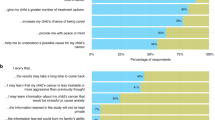Abstract
Previous studies have shown that groups of cancer sub-specialists differ in their stated willingness to undergo treatment for diseases lying within their area of expertise. In order to learn whether oncologists feel similarly about other forms of cancer, medical, radiation, and surgical oncologists were asked to fill out a questionnaire indicating whether they would be willing to undergo either chemotherapy or radiation therapy for a variety of common malignancies, or recommend them to a spouse or sibling. Subjects were also asked whether they would undertake an experimental therapy (interleukin-2) for any of three malignancies, or recommend such treatment to a spouse or relative. Fifty-one oncologists (14 radiation oncologists, 14 surgical oncologists, and 23 medical oncologists) were recruited from the staff of four university teaching hospitals. Although they agreed about accepting or declining therapy for some examples, there was considerable heterogeneity in their responses. In only 37% of the 30 cases involving standard therapies did greater than or equal to 85% of the oncologists agree that they would accept or refuse therapy. Only some of the variation of the responses could be attributed to the sub-specialty orientation of the oncologists. Physicians were as willing to recommend standard therapies for themselves as a spouse or sibling. Physicians were also divided in their opinion about whether they would accept a particular experimental therapy if diagnosed with one of three neoplasms. They were significantly more likely, however, to recommend it for a spouse or sibling than to accept it for themselves. Variation in the proportion of patients who receive anti-cancer therapies may relate, in part, to differences in opinion concerning the worth of such therapies among oncologists or primary physicians. This study shows that oncologists are quite heterogeneous with regard to their personal preferences for anti-cancer treatments for a variety of malignancies. Further studies are required to learn if such attitudes (among oncologists or primary physicians) directly affect the administration of such therapies.
This is a preview of subscription content, access via your institution
Access options
Subscribe to this journal
Receive 24 print issues and online access
$259.00 per year
only $10.79 per issue
Buy this article
- Purchase on Springer Link
- Instant access to full article PDF
Prices may be subject to local taxes which are calculated during checkout
Similar content being viewed by others
Author information
Authors and Affiliations
Rights and permissions
About this article
Cite this article
Lind, S., DelVecchio Good, MJ., Minkovitz, C. et al. Oncologists vary in their willingness to undertake anti-cancer therapies. Br J Cancer 64, 391–395 (1991). https://doi.org/10.1038/bjc.1991.315
Issue Date:
DOI: https://doi.org/10.1038/bjc.1991.315


